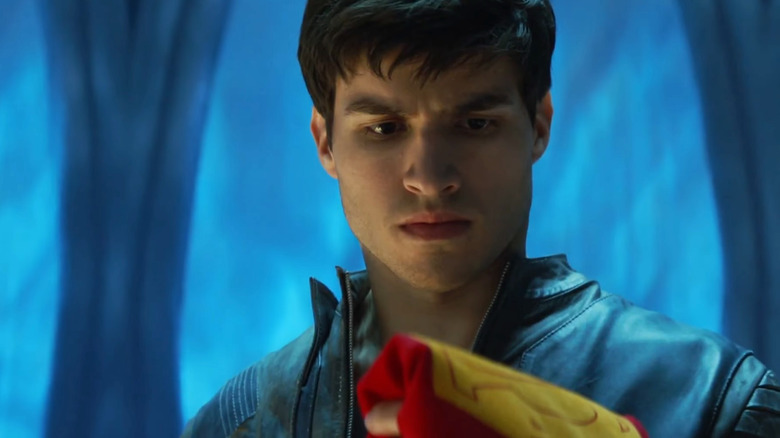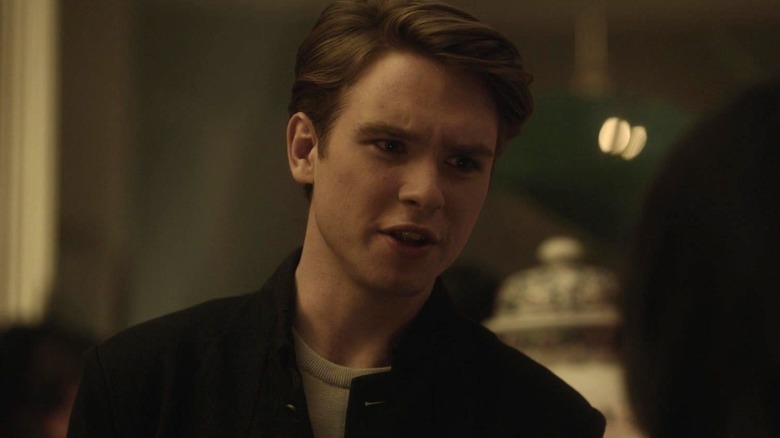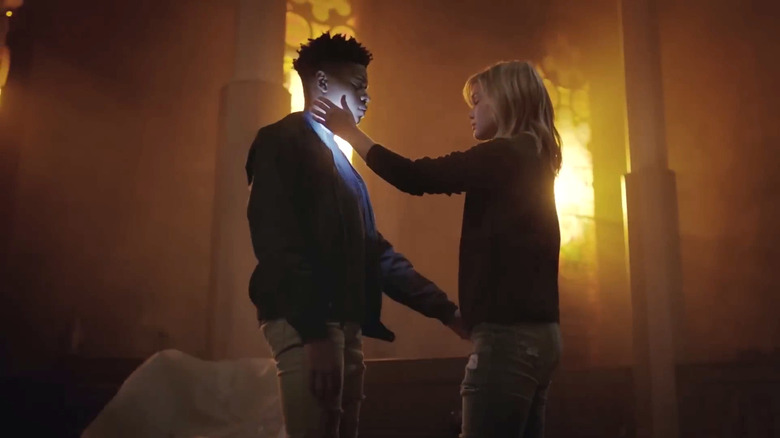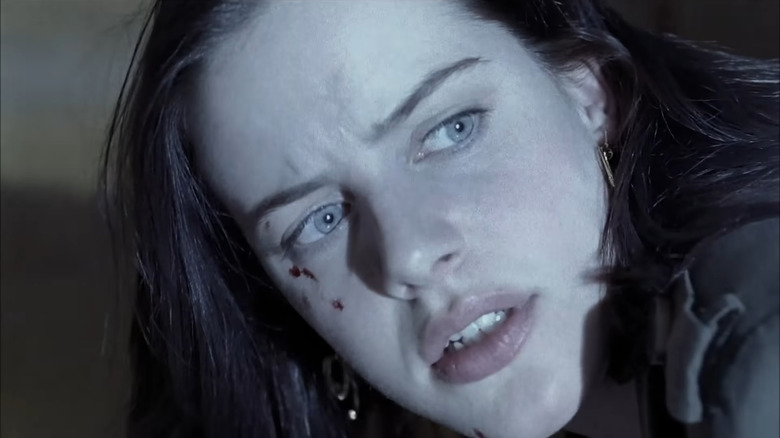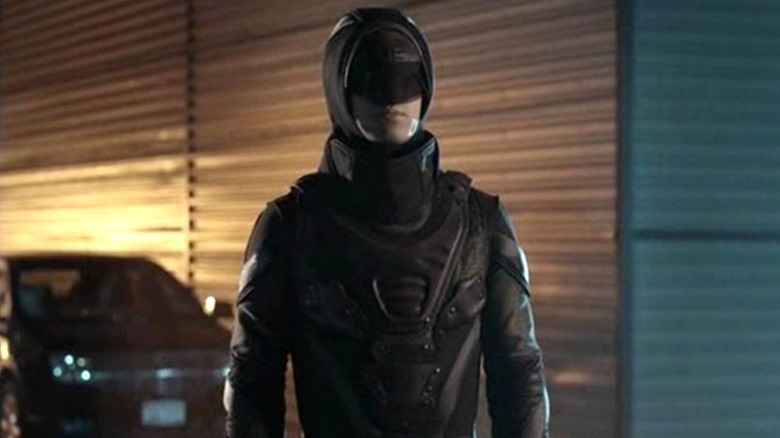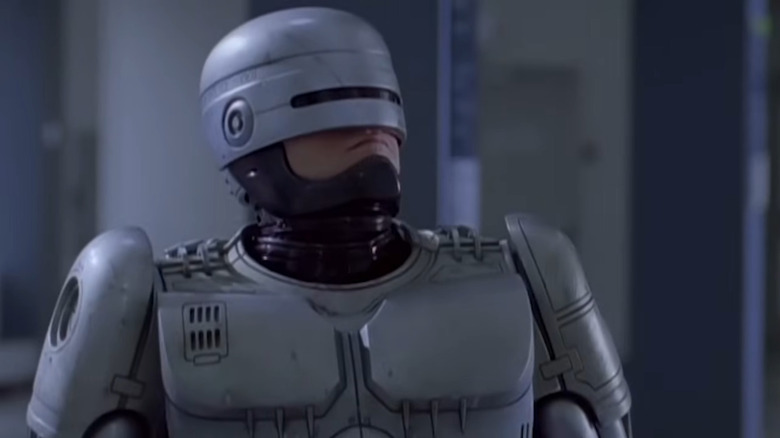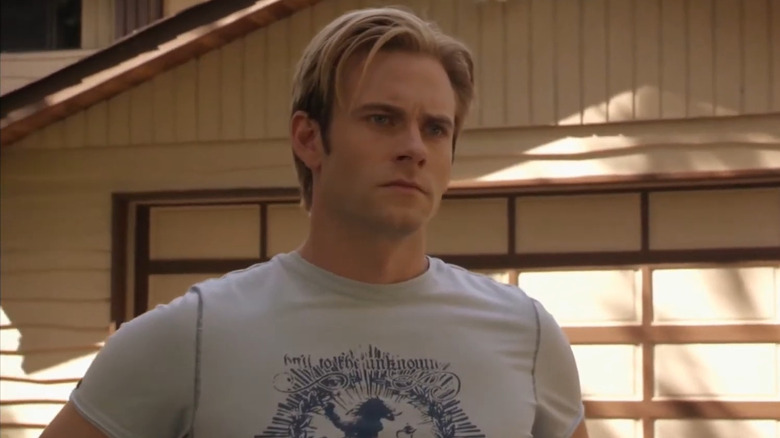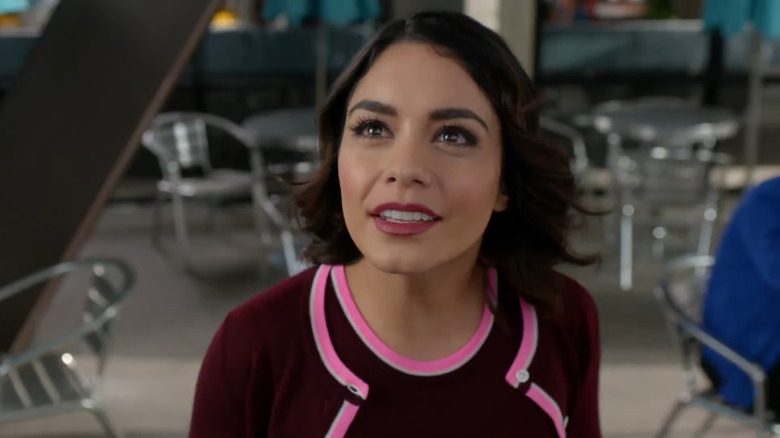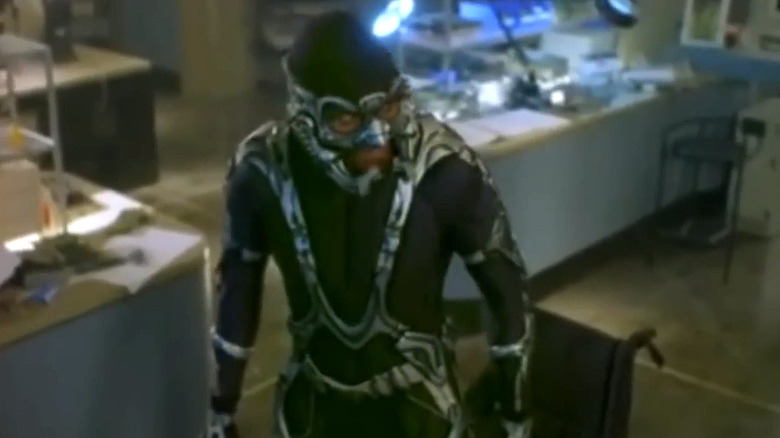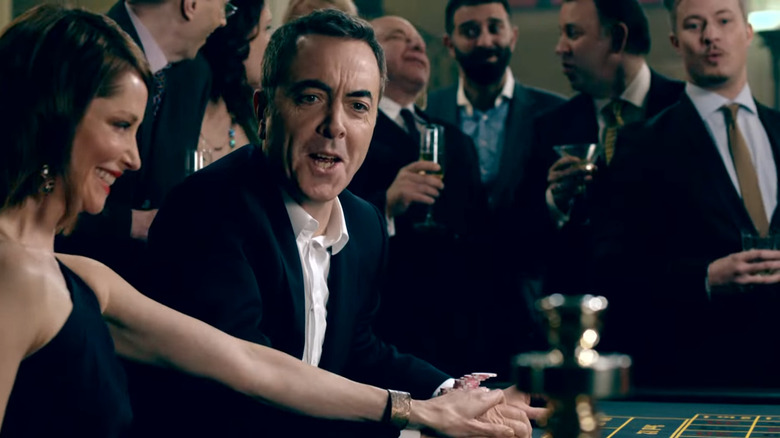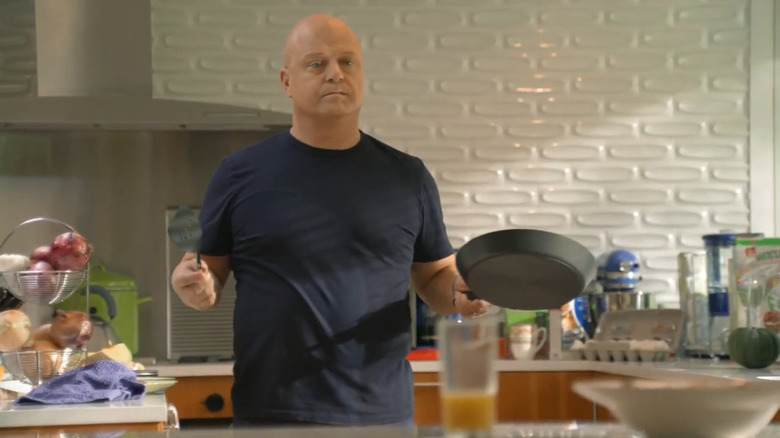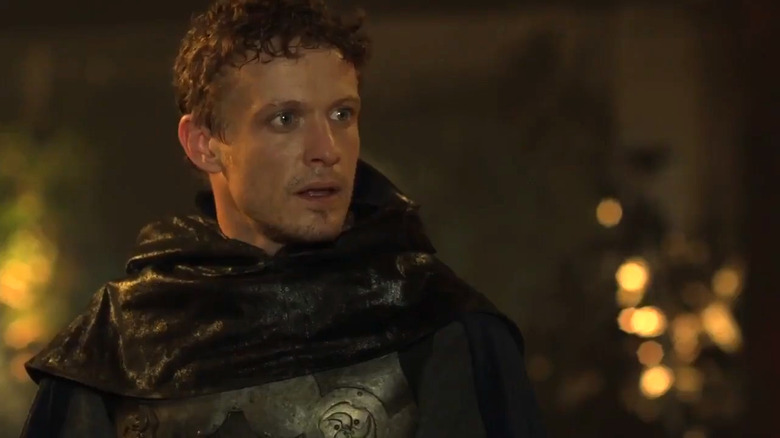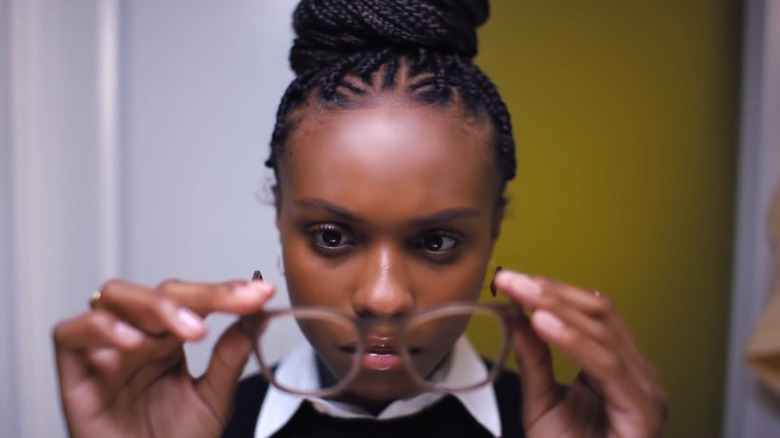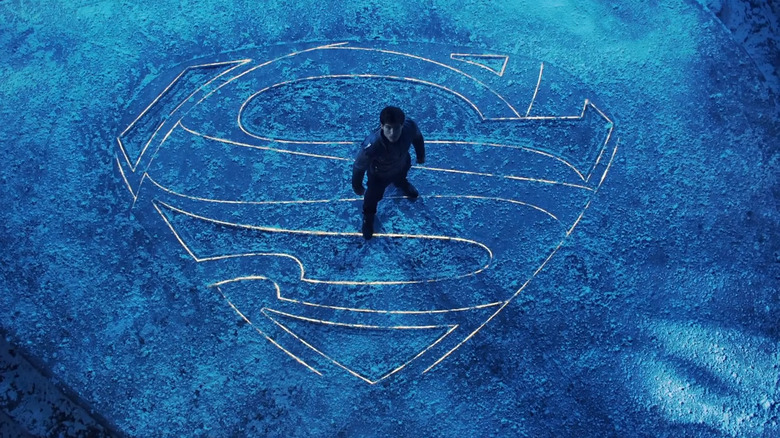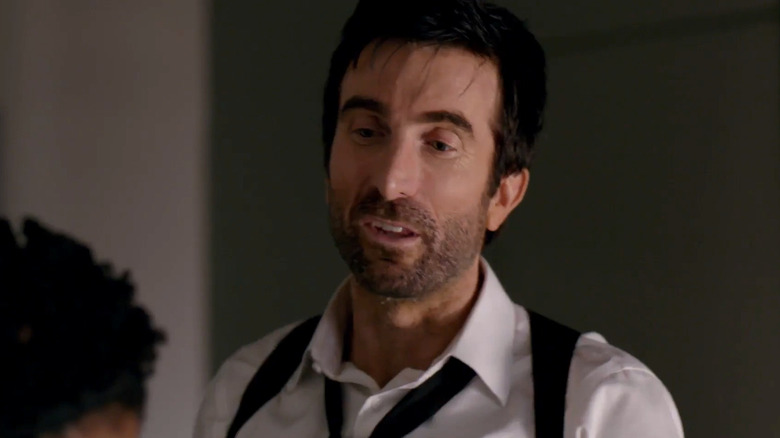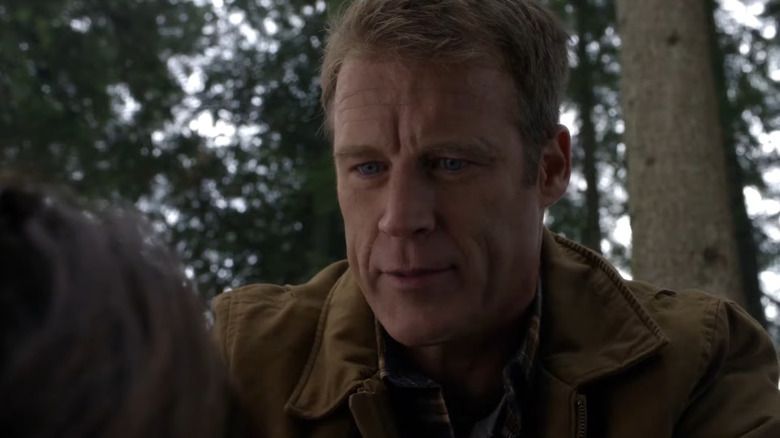15 Superhero TV Shows You Definitely Forgot Existed
There was a time where you couldn't flip to a channel, or log into a streaming service, without a superhero TV show dropping in to say, "Hello, good citizen!" It's slowed down now, sure, but the reality is the genre had existed long before the golden age of comic book movies and TV shows. These heroes have been part and parcel of TV, entertaining viewers with all their "super" stories.
It's easy to recall shows like "Smallville," "Arrow," and "Daredevil," because they left such a mark on pop culture, but what about the others? What about those series that came and went like a fever dream after eating a toasted cheese sandwich after midnight?
Some of the shows mentioned below will sound unfamiliar, while others may trigger a memory where you might have seen a trailer or news item about the series, but didn't realize it actually aired. So, let's head back to the archives and explore the forgotten superhero TV shows that you may want to check out afterward.
Gotham Knights
By 2023, The CW's grip on DC shows slipped. The reason for this was because of the formation of DC Studios, which aimed to unify all its properties rather than have fragmented pieces all over the entertainment board.
One of the last rolls of the dice was "Gotham Knights," a show that followed Bruce Wayne's adopted son Turner Hayes (Oscar Morgan), who was framed for Bruce's murder along with Duela (Olivia Rose Keegan) and siblings Harper (Fallon Smythe) and Cullen Row (Tyler DiChiara). While the series featured a number of known DC characters, it was as non-canonical as they come, and another attempt at a Batman show without the Dark Knight. Also, why it didn't focus on the actual Bat-Family from the comics is another mystery altogether.
Because of the bigger DC regroup happening behind the scenes, the writing seemed to be on the wall that "Gotham Knights" couldn't have a long lifespan. Resultantly, it fell through the cracks, and "Gotham Knights" was canceled at The CW after one season.
Cloak & Dagger
Marvel Comics' Cloak and Dagger aren't the most notable characters around. They pop up here and there — occasionally receiving a standalone series — but they're nowhere near as recognizable as other heroes in this universe. That's what makes the show "Cloak & Dagger" even more bizarre to fathom.
Debuting on Freeform in 2018, "Cloak & Dagger" told the origin story of Tyrone Johnson/Cloak (Aubrey Joseph) and Tandy Bowen/Dagger (Olivia Holt) and how they acquired their powers, then realized they're stronger when working in tandem. Technically, it was set in the Marvel Cinematic Universe, even though it had no effect on the events of other shows and movies.
While "Cloak & Dagger" received a positive critical reception, the series went under most people's radars, lasting just two seasons. Think about 2018 and 2019 for a second, though: It was jam-packed with an abundance of Marvel TV properties, including "Daredevil," "Jessica Jones," "Luke Cage," "The Punisher," and "Agents of S.H.I.E.L.D." Unsurprisingly, "Cloak & Dagger" fell to the wayside in terms of priority and influence. Also, don't be surprised if Cloak and Dagger are Marvel TV characters who never return to the MCU.
Bionic Woman
Most TV fans remember "The Six Million Dollar Man" and how Lee Majors' Steve Austin received bionic enhancements. Some may even remember the three-season spin-off, "The Bionic Woman," which saw Lindsay Wagner's Jaime Sommers receive the upgrades to her body. But did you know there was a "Bionic Woman" reboot in 2007?
If you didn't, join the club. Only eight episodes of the show aired on NBC. In this version, "EastEnders" actor Michelle Ryan played bartender Jaime Sommers, who experienced a horrifying car crash. In a bid to save her life, Jaime received radical cybernetic enhancements that also imbued her with incredible powers, which she used to do good.
"Bionic Woman" never received an opportunity to get going, as its production was impacted by the Writers Guild of America strike. The rapid drop in the ratings didn't help either, so even though Jaime Sommers possessed a multitude of superhuman abilities, none of them assisted her in preventing the network's falling ax here. Ultimately, "Bionic Woman" is remembered as one of the worst TV reboots of all time.
The Phantom
As a character, the Phantom endures, especially as a long-running comic strip. He's received serials, animated shows, and even a movie, starring Billy Zane as Kit Walker — but there was one release in 2009 that missed everyone: "The Phantom" two-part miniseries, which was created by "Carnivàle" showrunner Daniel Knauf and his son Charles.
Working as both a continuation and soft reboot of the story, "The Phantom" took place in a modern setting and focused on Chris Moore, who discovered he's adopted — part of the prestigious Walker family line — and became the 22nd Phantom. Playing Chris was Ryan Carnes, who "General Hospital" fans may recognize as one of the actors to have portrayed Lucas Jones on the show.
While this might not be the Phantom that people remember, the story didn't break canon, because the character is meant to be immortal. Also, it's not the first time that events have been fast-forwarded in the franchise, as "Phantom 2040" followed the adventures of Kit Walker, Jr., aka the 24th Phantom. The plan was for this miniseries to serve as a backdoor pilot and lead to a regular series, but it didn't happen.
RoboCop: Prime Directives
When it comes to RoboCop, it's often the 1987 Paul Verhoeven movie starring Peter Weller that comes to mind first. After that, the franchise took a few "interesting" turns, even having Bart Bass himself — Robert John Burke — playing Alex Murphy in "RoboCop 3." As soon as the film trilogy wrapped, a short-lived live-action series aired in 1994.
That wasn't RoboCop's only stint in the live-action TV world, though, as he returned to the screen for a 2001 four-part miniseries titled "RoboCop: Prime Directives" — which was more like four movies, but we digress. Page Fletcher played the bionic law enforcer here, in a story set a decade after the events of the first movie.
Here's the shocker: "RoboCop: Prime Directives" was pretty darn good, choosing to follow the original movie's lead and apply its satirical sensibilities. The sad part? It came and went on Syfy without much noise. No one could even buy it for a dollar, because few knew of its existence.
Flash Gordon
Flash! A-ah! Flash Gordon is a character who's traversed across numerous adaptations, but he's best remembered for the 1980 film, where Sam J. Jones played the titular hero and Max von Sydow portrayed the glorious villain Ming the Merciless. In 2007, "Flash Gordon" returned to the realm of TV for a one-season run on Syfy.
Inspired by the comic strip, the sci-fi show saw Eric Johnson (better known as Whitney Fordman from "Smallville") playing Flash, who traveled from Earth to Mongo, where he met the planet's evil leader Ming (John Ralston). While the Mike Hodges-directed movie embraced vibrant colors and infinite quirk, the series tried to play it much more straight — to its own detriment, as evidenced by its quick cancellation and lack of fanfare.
"Flash Gordon" is such a rich and vibrant story, and the film tapped into the zeitgeist and excitement created by the release of "Star Wars" a few years earlier. The series forgot fun in its other pair of pants, delivering a largely forgettable and generic adaptation of the savior of the universe.
Powerless
The sitcom "Powerless" was a classic case of wrong place, wrong time. The year 2017 wasn't good for the DC brand, apart from the release of Patty Jenkins' "Wonder Woman." After the critical and fan disappointment of "Batman v. Superman: Dawn of Justice" and "Suicide Squad," the disaster of "Justice League" also loomed. Consequently, "Powerless" — a series that followed the misadventures of the team at Wayne Security that creates products for humans to feel safer among all the damage caused by superheroes and villains — felt out of place and tonally mismatched to what was happening around it.
The show featured the talents of Vanessa Hudgens, Danny Pudi, and Alan Tudyk, but even that couldn't save "Powerless" from being canceled at NBC and having its remaining episodes pulled. Eventually, an unaired episode featuring Adam West was released.
One can't help but look at "Powerless" as a casualty of (boardroom) war. As a matter of fact, this seems like a show that would feel right at home under James Gunn's DC Universe. It's very much DC's version of Marvel's Damage Control.
M.A.N.T.I.S.
Carl Lumbly holds strong ties to the superhero genre. After all, he voices Martian Manhunter in several DC projects, plays M'yrnn J'onzz in "Supergirl," and portrays Isaiah Bradley in the MCU. In 1994, though, Lumbly received the opportunity to headline his own original superhero show created by Sam Raimi and Sam Hamm: "M.A.N.T.I.S."
Lumbly played Dr. Miles Hawkins, a scientist who's left paralyzed after a policeman shoots him. When justice isn't served, and Miles starts to feel as if the system is failing him and the Black community, he creates a powerful exoskeleton that allows him to walk again and enhances other attributes. He takes up the mantle of M.A.N.T.I.S. and keeps the streets safe from all evildoers. And no, this has nothing to do with Pom Klementieff's Marvel character of the same name.
Lumbly's charismatic performance aside, the issue with "M.A.N.T.I.S." was that the pilot differed too much from the series. A lot of the initial elements introduced were scrapped, numerous characters were recast, and the show went through too much tinkering in its single-season run. It never felt settled, nor certain of what it was.
Stan Lee's Lucky Man
Stan Lee's name remains synonymous with all things Marvel, but the iconic comic book creator tackled the odd project outside of the House of Ideas. For instance, he served as co-creator of "Stan Lee's Lucky Man" alongside Neil Biswas.
Released at the height of comic book movie and TV euphoria in 2016, "Stan Lee's Lucky Man" somewhat lost itself in the shuffle of everything else, with only the most diehard of fans knowing it was around on the U.K.'s Sky One. It was a different kind of superhero show, though, as DI Harry Clayton (James Nesbitt) received a magical bracelet that empowered him with luck. Yet, there's a price for using this bracelet, which Harry soon came to realize.
"Stan Lee's Lucky Man" proved to be popular in the United Kingdom, receiving three seasons overall. However, it never managed to take off in the rest of the world. A shame, really, since its premise and execution resulted in a tidy and entertaining series.
No Ordinary Family
Thanks to the Fantastic Four, the whole "family of superheroes" concept has been a tried-and-tested formula in the genre. In 2010, Greg Berlanti and Jon Harmon Feldman took another stab at it with the creation of "No Ordinary Family," which was about — you guessed it — a family that gained superpowers. In this instance, they didn't fly to space; instead, their plane crashed in the Amazon rainforest.
Despite not being the most original premise in the world, "No Ordinary Family" boasted a formidable cast with Michael Chiklis, Julie Benz, Kay Panabaker, and Jimmy Bennett playing the members of the Powell family, while Autumn Reeser, Lucy Lawless, Josh Stewart, Amy Acker, and Cybill Shepherd featured here, too.
"No Ordinary Family" certainly didn't lack the star power. Also, the critical and fan reviews proved to be rather positive toward it. What it didn't have in its favor was the ratings, as the show was in a constant freefall after its premiere. Unsurprisingly, it went from "No Ordinary Family" to "No Family" after a single season.
The Cape
NBC might have seen "The Cape" as a natural replacement for "Heroes" in 2011. While it didn't have the sci-fi edge of the latter, the former filled the gap for those looking for more superhero stories. Speaking of which, "The Cape" didn't feature a complex narrative: Former cop Vince Faraday (David Lyons) was framed by the powerful CEO Peter Fleming (James Frain) for crimes he didn't commit. Vince was believed to be dead, but he wasn't. So, he returned and adopted the identity of the vigilante known as The Cape, to fight back against Fleming and all the baddies of Palm City.
All in all, "The Cape" was generic superhero fodder, but it didn't offend. It turned out to be a breezy and fun watch, and it's easy to see how viewers could become invested in those stories and characters over time.
Unfortunately, it didn't meet NBC's expectations, as it was cut from initially 13 episodes to 10. In the end, the finale didn't even air on TV, as The Cape's crusade continued online and concluded on NBC's website.
Naomi
Naomi McDuffie is a relatively new character in the DC Universe, having debuted in the comics in 2019. By 2022, she had her own show, "Naomi," with Ava DuVernay and Jill Blankenship as showrunners, on The CW.
In this series, Naomi (Kaci Walfall) was a major fan of superheroes, even hosting her own Superman fan site. Her life changed when she discovered that she, too, had superpowers. The first (and ultimately only) season of the show followed Naomi as she learned how to navigate her newfound abilities and chose to use them for good like the heroes she admired.
"Naomi" exploded out of the gate with a 91% critical approval rating on Rotten Tomatoes, as the charm of the series was cited as one of its strongest points. Unfortunately, the viewership didn't correlate with the positive reviews, as "Naomi" became just another superhero show on The CW in a time where everyone was feeling the burnout of the genre. There was no Season 2 for "Naomi," as The CW canceled it.
Krypton
Sometimes, you wonder how certain TV shows get made, and that's the case with 2018's "Krypton." Let's be clear here: Developed by David S. Goyer, Syfy's "Krypton" was a wonderful piece of science fiction, but it was a Superman show without the Man of Steel. Now, that could work if you explore the history of his home planet through the eyes of his father, Jor-El, but "Krypton" went further back to the days of his grandfather, Seg-El (Cameron Cuffe), and his relationship with the Zods.
While "Krypton" figured out a way to include DC mainstays such as Adam Strange (Shaun Sipos), Lobo (Emmett J. Scanlan), and Brainiac (Blake Ritson), it was a generational leap too far to have appealed to the casuals. Ultimately, this was a show that was created for the diehard Superman fans, and only the diehards. This showed in the ratings, too, as "Krypton" was sent into the Phantom Zone after two seasons on air, while the expected "Lobo" spin-off failed to launch, as well.
Powers
Not to be confused with "Power" or "Powerless" is 2015's "Powers." Developed for TV by Brian Michael Bendis and Charlie Huston, it was a show based on the comic book series created by Bendis and Michael Avon Oeming. Oh, and it aired on the PlayStation Network. Remember that? Don't worry, not many do; it was a short-lived endeavor by PlayStation to create its own original programming.
Essentially, "Powers" was a police procedural following detectives Christian Walker (Sharlto Copley) and Deena Pilgrim (Susan Heyward) who worked for the Powers Division, a special police unit that investigated crimes involving super-powered people. Walker used to be a superhero himself until he lost his powers and went into law enforcement.
"Powers" put an interesting spin on the procedural format and boasted a handful of colorful characters, à la "The Boys," but the reality was that not enough people knew about it; it was done after two seasons.
Human Target
Fun fact: A "Human Target" series that most people don't know about, starring Rick Springfield, aired for a brief period in 1992. This wasn't enough, though, so an effort was made to make yet another show based on the DC character that also went under the radar.
The reason the "Human Target" comic book endears itself to readers is because Christopher Chance takes on his clients' identities to protect them from hits and other threats. He's like Ethan Hunt in "Mission: Impossible," who goes undercover in an all-consuming manner.
So, it's weird how 2010's "Human Target" chose to go down another path, as Christopher (Mark Valley) became a part of his clients' lives through other identities or lurking in the shadows. Yeah, it's another kind of deception and infiltration, but it took away the fun of the comic book version of the character who puts on disguises and plays various roles. Having said that, the show still received two seasons at Fox before being canceled. Maybe if it had stuck closer to the source material, it may have become a more memorable superhero TV show.
